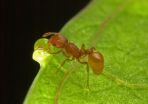(Press-News.org) Geneva, Switzerland, 17 April 2015 -- Cancer DNA circulating in the bloodstream of lung cancer patients can provide doctors with vital mutation information that can help optimise treatment when tumour tissue is not available, an international group of researchers has reported at the European Lung Cancer Conference (ELCC) in Geneva, Switzerland.
The results have important implications for the use of cancer therapies that target specific cancer mutations, explains Dr Martin Reck from the Department of Thoracic Oncology at Lung Clinic Grosshansdorf, Germany, who presented the findings at the conference.
Testing for the presence of these mutations in the tumour itself is not always possible, however studies have suggested that DNA from the tumour that circulates in the bloodstream of patients may provide similar information.
The large international ASSESS study aimed to compare the ability of blood testing to detect EGFR mutations with the more standard method of testing the tumour itself.
"We were really asking a question on behalf of patients," Reck said: "Is there a valid test that can identify an EGFR mutation and give me the opportunity for superior treatment, even if my lung tumour is not accessible for bronchoscopy or CT-guided biopsy? And, are the results of this blood test in agreement with the results of the 'gold-standard' tissue test?"
Overall, the study included 1162 matched tissue and blood samples. Comparison of the outcomes of EGFR testing in the two techniques showed an 89% rate of agreement between the blood test and tissue test. Plasma testing identified about half of the patients with EGFR mutations, compared to tissue testing (a sensitivity of 46%).
The tests in this study were not performed in specially selected central labs, but in local labs that are used for daily clinical routine. "This is important, because it does reflect the clinical reality and not a 'virtual' trial reality," Reck said.
"The results mean that for patients who do not have accessible tumour tissue, plasma testing for EGFR mutation turns out to be an attractive option to offer these patients adequate targeted treatment," Reck added.
Commenting on the study, Dr Rafael Rosell, from the Catalan Institute of Oncology, Barcelona, Spain, expert on the ESMO Faculty on Lung cancer, said: "Cell-free DNA detected in the bloodstream of cancer patients represents an excellent tool to examine genetic alterations that are usually found through tumour tissue testing. This represents one of the most astonishing phenomena in biology."
"The results of this study validate that the presence of EGFR mutations in circulating DNA from plasma or serum (fractions obtained from whole blood) can be detected in around half of the patients."
Already, since this study was performed, improvement of techniques have seen the sensitivity of tests for EGFR mutations in circulating tumour DNA increase further, Rosell noted.
"This work paves the way for further studies and expands the routine use of examining mutations such as EGFR mutations as part of cancer patient care," Rosell said.
INFORMATION:
Notes to Editors
Disclaimer
Information contained in this press release was provided by the lecture authors. It does not necessarily express ESMO's or IASLC's point of view.
About the European Society for Medical Oncology (ESMO)
The European Society for Medical Oncology (ESMO) is the leading European professional organisation committed to advancing the specialty of medical oncology and promoting a multidisciplinary approach to cancer treatment and care.
ESMO's mission is to advance cancer care and cure through fostering and disseminating good science that leads to better medicine and determines best practice.
To find out more about ESMO, please visit: http://www.esmo.org
About the International Association for the Study of Lung Cancer (IASLC)
The International Association for the Study of Lung Cancer (IASLC) is the only global organisation dedicated to the study of lung cancer. Founded in 1974, the association's membership includes more than 3,500 lung cancer specialists in 80 countries.
To learn more about IASLC please visit http://www.iaslc.org
Abs. 35O_PR
Investigating the utility of circulating-free tumour-derived DNA (ctDNA) in plasma for the detection of epidermal growth factor receptor (EGFR) mutation status in European and Japanese patients (pts) with advanced non-small-cell lung cancer. M.Reck, DE
To be presented at ELCC 2015 on Friday 17.04.2015 from 16:30 to 18:00 "ESMO-IASLC Best Abstract " Session
Geneva, Switzerland, 17 April 2015 -- Almost one in four patients (24%) with advanced lung cancer in Europe, Asia and the US are not receiving EGFR test results before being started on treatment, researchers report at the European Lung Cancer Conference.
Medical Oncologist James Spicer from King's College London at Guy's Hospital, London, and colleagues studied how widely hospitals had implemented testing for mutations in the epidermal growth factor receptor gene among lung cancer patients.
Targeted therapies can more effectively treat cancers that are known to carry ...
Recent research published in The Diabetes Educator by Dr. Shiela Strauss, associate professor of nursing and co-director of the Statistics and Data Management Core for NYU's Colleges of Nursing and Dentistry, along with a team of NYU researchers, reveals differing perceptions among adult populations at-risk for diabetes that may offer new approaches to diabetes education and prevention.
"We found that there are differences in the perceptions of those who are at risk for diabetes that depend on the specific characteristics that place them at risk," said Strauss.
Illness ...
A team from Disney Research and Carnegie Mellon University have devised a 3-D printer that layers together laser-cut sheets of fabric to form soft, squeezable objects such as bunnies, doll clothing and phone cases. These objects can have complex geometries and incorporate circuitry that makes them interactive.
"Today's 3-D printers can easily create custom metal, plastic, and rubber objects," said Jim McCann, associate research scientist at Disney Research Pittsburgh. "But soft fabric objects, like plush toys, are still fabricated by hand. Layered fabric printing is one ...
Disney Research has demonstrated that battery-free, radio frequency identification (RFID) tags can be used to cheaply and unobtrusively determine how people use and interact with daily objects, enabling new types of interactive play, smart homes and work environments, and new methods for studying consumer shopping habits.
RFID tags are designed to simply report an identifying code when energized by an RFID reader, but a Disney Research team directed by Dr. Alanson Sample showed that the radio frequency signals transmitted by these tags provide a unique RF signature which ...
An international team of scientists have put forward a blueprint for a purely space-based system to solve the growing problem of space debris. The proposal, published in Acta Astronautica, combines a super-wide field-of-view telescope, developed by RIKEN's EUSO team, which will be used to detect objects, and a recently developed high-efficiency laser system, the CAN laser that was presented in Nature Photonics in 2013, that will be used to track space debris and remove it from orbit.
Space debris, which is continuously accumulating as a result of human space activities, ...
Half of all patients who survive a cardiac arrest experience problems with cognitive functions such as memory and attention. This has been shown by a major international study led from Lund University. Surprisingly, however, a control group comprising heart attack patients had largely the same level of problems. This suggests that it is not only the cardiac arrest and the consequent lack of oxygen to the brain that is the cause of the patients' difficulties.
The study led by Lund University involved 950 cardiac arrest patients in Europe and Australia. Six months after ...
This news release is available in Japanese.
It seems unnatural that a species could survive without having sex. Yet over the ages, evolution has endowed females of certain species of amphibians, reptiles and fish with the ability to clone themselves, and perpetuate offspring without males. Researchers at the at the Okinawa Institute of Science and Technology Graduate University (OIST) found that in species where females have evolved the ability to reproduce without males relatively recently, fertilization is still ensuring the survival of the maximum number of healthy ...
Scientists at the Vetmeduni Vienna investigated whether stomach ulcers in cattle are related to the presence of certain bacteria. For their study, they analyzed bacteria present in healthy and ulcerated cattle stomachs and found very few differences in microbial diversity. Bacteria therefore appear to play a minor role in the development of ulcers. The microbial diversity present in the stomachs of cattle has now for the first time been published in the journal Veterinary Microbiology.
Gastritis and stomach ulcers in humans are often caused by the bacterium Helicobacter ...
Breast cancer patients often display mild cognitive defects even before the initiation of chemotherapy. A new study by Ludwig-Maximilians-Universitaet (LMU) in Munich researchers now attributes the syndrome to post-traumatic stress induced by diagnosis of the disease.
A large number of studies have shown that cancer patients very often exhibit mild deficits of attention, memory and other basic cognitive functions. The phenomenon has generally been attributed to putative side-effects of chemotherapeutic drugs on the brain, and the condition is therefore popularly referred ...
WASHINGTON --Droperidol is safe and effective for calming violent and aggressive emergency patients, and the negative effects that garnered a black box warning from the Food and Drug Administration (FDA) are actually quite rare. A new study of the once ubiquitous, now scarce, sedating agent was published online Wednesday in Annals of Emergency Medicine ("The Safety and Effectiveness of Droperidol for Sedation of Acute Behavioral Disturbance in the Emergency Department").
"In our study, the two side effects that led to the black box warning - QT prolongation and torsades ...

